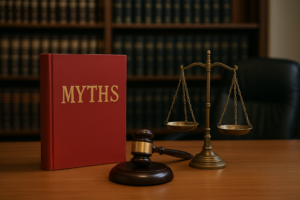Empowering Individuals to Seek Justice Together
When one person stands up, it’s powerful. When thousands do, it can change everything. This strength in numbers can force real accountability, especially when individual legal actions would be too small to pursue alone.
Class action lawsuits are legal cases filed on behalf of a group of people harmed by the same company, product, or policy. This powerful legal tool enables individuals to join forces when seeking justice against corporations, institutions, or entities that have caused similar harm to many.
This article explains how class actions work, who can join, and why they’re a powerful tool for justice in our legal system.
If you’ve been affected by corporate wrongdoing, you may not be alone—and you may have legal options.
Find Out If You Have a Case!
What Is a Class Action Lawsuit?
A class action lawsuit is a legal mechanism that allows many people with similar claims to sue as one group. In these cases, one or several lead plaintiffs serve as the class representatives, advocating on behalf of everyone who experienced comparable harm.
The core advantage is efficiency. The case is tried once for all class members, eliminating the need for hundreds or thousands of separate lawsuits addressing the same issue.
Class actions commonly arise in cases involving:
- Defective products causing similar injuries
- Consumer fraud affecting large groups of customers
- Employment violations impacting numerous workers
- Privacy breaches compromising personal data
- Pharmaceutical or medical device injuries
How a Class Action Lawsuit Works
Step-by-Step Breakdown:
- Identification of Harm – Multiple people report similar damages or legal violations from the same source
- Filing the Lawsuit – Attorneys file a complaint representing the entire proposed class
- Class Certification – The court decides whether the case meets the specific criteria under Federal Rule of Civil Procedure 23 to proceed as a class action
- Discovery & Litigation – Evidence is gathered, and legal arguments are developed
- Settlement or Trial – Most cases end in a negotiated settlement, though some proceed to trial
- Payout Distribution – If successful, qualified class members receive their share of compensation
To qualify for class certification under Federal Rule of Civil Procedure 23, the court must determine that the proposed class meets all four Rule 23(a) requirements (numerosity, commonality, typicality, and adequacy) and at least one Rule 23(b) requirement. Rule 23(b)(3), which requires that common issues predominate over individual ones, is the most common category for cases seeking monetary damages and includes the opt-out mechanism.
Who Can Join a Class Action?
Not everyone qualifies for every class action, but if you’ve been harmed in a similar way to others, you might be eligible to participate. You may qualify if:
- You were affected by the same product, company, or policy as others in the class
- You suffered similar damages as other class members
- You received a formal notice of inclusion, or you match the class definition published in case materials
- You haven’t opted out of the case (in opt-out class actions)
Class actions seeking monetary damages typically operate on an “opt-out” basis, automatically including eligible individuals unless they specifically request exclusion. However, Classes certified under Rule 23(b)(2), typically used for injunctive or declaratory relief, generally do not provide opt-out rights.
Why Class Actions Matter
Class actions serve several crucial functions in our justice system:
- They level the playing field, allowing everyday people to challenge powerful corporations
- They help victims seek justice who might not have the resources to afford an individual lawsuit
- They hold companies accountable for systemic wrongdoing that affects large numbers of people
- They promote transparency, regulatory reform, and policy changes that benefit society
One person’s complaint may be ignored—thousands united cannot be.
Class Action vs. Mass Tort: What’s the Difference?
Class Action | Mass Tort |
One trial for all plaintiffs | Individual trials or damages evaluated separately |
Common injuries and facts | Injuries may vary significantly by individual |
Lower compensation per person | Often higher individual compensation |
Efficient for minor-to-moderate damages | Suited for serious physical or medical harm |
Mass torts, unlike class actions, are typically consolidated through Multidistrict Litigation (MDL) in federal court. Each plaintiff maintains an individual case, but pretrial proceedings are coordinated for efficiency. If your injuries are highly individual or involve significant medical damages, a mass tort may be the better route for personalized compensation.
Famous Examples of Class Action Lawsuits
Anderson v. Pacific Gas & Electric (The “Erin Brockovich” Case)
Secured a then-record $333 million settlement for environmental contamination that caused serious health issues in a California community.
Volkswagen Emissions Scandal
Resulted in billions in compensation for millions of car owners misled about vehicle emissions.
Equifax Data Breach
One of the largest data breach settlements in history, compensating consumers whose personal information was compromised.
Recent Changes in Class Action Law
Supreme Court rulings have significantly impacted class action requirements in recent years:
- Wal-Mart Stores, Inc. v. Dukes (2011) tightened the commonality requirement, making it harder to certify employment discrimination classes
- Comcast Corp. v. Behrend (2013) established that damages models must measure harm on a class-wide basis
- These decisions have established stricter requirements for proving commonality among class members, particularly in employment and consumer cases
These rulings underscore the importance of expert legal guidance when pursuing or participating in a class action.
(FAQ) Frequently Asked Questions
Do I need to pay to join a class action lawsuit?
No. Most class action attorneys work on a contingency basis—you pay nothing unless there’s a recovery. The attorneys typically receive a percentage of any settlement or judgment as approved by the court.
Do I need to pay to join a class action lawsuit?
No. Most class action attorneys work on a contingency basis—you pay nothing unless there’s a recovery. The attorneys typically receive a percentage of any settlement or judgment as approved by the court.
Will I need to go to court?
In most cases, no. The lead plaintiff(s) appear in court, while other class members participate passively. You may need to complete claim forms or provide documentation of your injury.
How much money can I receive?
It depends on the settlement amount, number of class members, and your documented losses. Some class actions result in small individual payments, while others provide substantial compensation based on provable damages.
How do I know if I'm eligible for a class action lawsuit?
Eligibility depends on whether you fall within the defined class of affected individuals. Class definitions typically specify time periods, locations, products purchased, or services used that determine who qualifies as a class member. If you receive a class action notice, this indicates that the attorneys or claims administrator believes you might qualify for inclusion.
What happens if I ignore a class action notice?
If you receive a notice and take no action, you’ll typically be bound by the outcome of the case, whether favorable or not. This means giving up your right to sue individually while potentially becoming eligible for settlement benefits if the class prevails.
How long do class action lawsuits typically take?
Class actions often take several years from filing to resolution. The complexity of these cases, including the certification process, discovery, potential appeals, and settlement administration, contributes to their extended timeline.
Can I opt out of a class action lawsuit?
Yes, class members usually have the right to opt out of the litigation in cases seeking monetary damages. Opting out preserves your ability to pursue an individual lawsuit while forfeiting any benefits from the class action settlement or judgment.
What government resources provide information about class actions?
The Federal Trade Commission (FTC) offers consumer information about class action settlements at consumer.ftc.gov. The United States Courts website provides details about class action procedures and rules at uscourts.gov. For specific state-level information, check your state’s court system website.
What to Do If You Think You're Part of a Class Action
If you believe you might qualify for an ongoing class action:
✅ Look for public notices (mail, email, or online legal notice boards)
✅ Visit the official class settlement website
✅ Gather documentation (receipts, emails, invoices, etc.)
✅ Be mindful of claim deadlines
✅ Speak with a class action attorney if you’re unsure about your rights
Class actions are one of the most effective tools for holding corporations and institutions accountable. If you believe you’ve been affected by systemic wrongdoing, don’t stay silent. You may have legal rights and the power of a class behind you.
By uniting similar claims, these legal tools create accountability, promote change, and provide compensation that might be impossible to achieve individually.
Stay informed about your rights, respond to legitimate class notices, and recognize when you might be part of a larger group that has been harmed.
CONTACT RAMOS LAW
If you believe you have a class action case, dont wait to seek legal advice. Legal professionals experienced in class action litigation can help evaluate your eligibility and determine the appropriate course of action for your claim.
CONTACT RAMOS LAW

10 Myths About Filing a Lawsuit — Debunked
The Truth Behind Legal Claims That Every Accident Victim Should Know Think filing a lawsuit is only for greedy people or reserved for dramatic courtroom battles? Think again. Many people avoid filing valid claims because of common myths and misinformation circulating widely about the legal system. This misinformation can prevent

What Happens If My Personal Injury Case Goes to Trial
Table of Contents The Reality of Personal Injury Litigation Did you know that over 90% of personal injury cases settle out of court? But what happens when negotiations fail and your case goes to trial? Facing a trial can be daunting, and the uncertainty surrounding legal proceedings can heighten anxiety.

Crock-Pot 6-Quart Express Crock Multi-Cookers Recalled Due to Burn Hazard
Sunbeam Crock-Pot Recall: Were You Injured? The Consumer Product Safety Commission (CPSC) has issued a recall of nearly one million Crock-Pot 6-Quart Express Multi-Cookers. The recall, issued on November 24, 2020, follows multiple reports of severe injuries attributed to malfunctioning lids. The appliance has the potential to pressurize if the lid